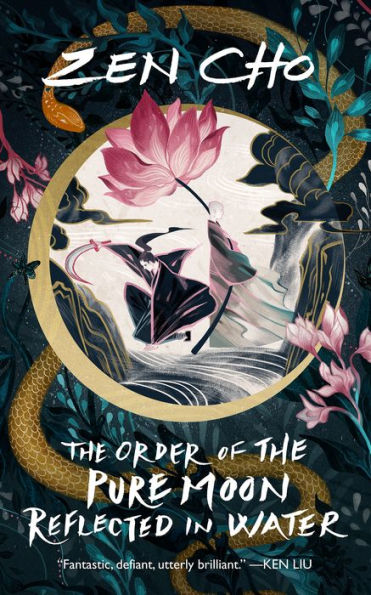There beyond the edges of the battlefield, there across a landscape of ruin and history in the making, of high stakes and hard choices, there is a coffeehouse. There is a motley, tight-knit crew of bandits, and here they meet a waitress who was a nun once, and from there, nothing will be quite as it seems.
Zen Cho’s novella The Order of the Pure Moon Reflected in Water is a small-scale story on the crest of an enormous wave of war. The fight bleeds in in unexpected places. Cho crafts a different sort of intimacy within the story: we as readers don’t get very close to any one character, and so we can’t necessarily trust any of their perspectives. In this way, it feels almost like we’re one of their crew along for the journey, unearthing the rules of the world and their relationships from each of them in turn.
When Guet Imm invites herself along to join the group, the men take to her readily enough, but they don’t take her seriously. She had been in pious seclusion for over a decade as part of her devotion to the Pure Moon Order, and now she must learn to navigate a war-torn world. Meanwhile, the ragtag group of bandits have found themselves on a mission steeped in secrecy and danger. They soon discover there is more to each other than any of them expected. Their histories intersect, and so, perhaps, will their futures.
The joy of this novella is in the unfurling. Cho subverts expectations to surprising and delightful effect. Order works a specific alchemy, crafting a precious, tantalizing window into a scoping world within its brief page-count. Guet Imm and Tet Sang aren’t warriors or kings, and by rights a story of this setting wouldn’t anticipate them as the stars. And yet, this is how nations change, in the small movements of underestimated people. How the universe is remade, and how fate can realign. Fate, indeed, is as mutable as identity, and within Order, characters remake themselves to survive. An ongoing process of working towards being truer to themselves, as the circumstances of their world uproot and turn to riot.
Buy the Book


The Order of the Pure Moon Reflected in Water
Don’t expect an action-packed wuxia drama. Cho herself tweeted it’s not necessarily explicitly wuxia, more along the lines of fic of a wuxia. It’s a queerer, lyrical take: bringing subtext to forefront. She queers the expectations by centering primarily on the emotional dynamics of an entirely queer cast. There’s violence and magic, but they’re used in quietly powerful, surprising ways that serve to complicate not only our understanding of the worldbuilding, but that of the characters, many of whom find what they know of their world, their journey, and their companions to be something else entirely.
Romance threads through the journey, but Cho queers this too. It’s central but it doesn’t take up separate space, woven into the plot, emerging for us as it does for the characters, and upon reckoning it was there all along. Like the overarching narrative itself, it’s subtle and unassuming until it’s very much not, and the sweet intensity of the build sprawls in its glory.
Like its name, The Order of the Pure Moon Reflected in Water shimmers with great power, scoping realities of war and faith refracted in the manifestations of its characters and their dynamics. Cho gives us a glimpse, a prismatic window, into a profound and complex world, and its story is made all the richer by its close, intimate telling.
As the war does bleed in, it illuminates with stark clarity how all of them are where they are because of it. They live in a landscape near undone by tyranny and poverty, thrown together to try and survive. Cho never lets it become weighty with darkness, balancing it, as she does so well, with purposeful humor and levity that shifts from crude to tender. It makes for a cheeky romp, but one in which Cho also interrogates what it is to be a “bandit” in wartime, and the potency of faith. So much of the charm of this novella lies within the found family dynamic, especially because Cho writes it so sweetly queernormative. She plays with gender expectations with multiple characters throughout the entire novella.
Cho’s writing is satisfyingly defiant, on a sentence level and story level alike. She constantly subverts expectations within the world she’s laid out. Order is tautly woven and innovative, written with a spare, deft hand. It delivers an understated, brilliantly crafted adventure of transmutation, soft men and cutthroat women, and a journey that takes them apart and pieces them back together, not quite as they were.
Lithe and literary, this is a jewel of a novella, resonating with Cho’s smart, specific magic.
The Order of the Pure Moon Reflected in Water is available from Tordotcom Publishing.
Maya Gittelman is a queer Pilipinx-Jewish diaspora writer and poet. Their cultural criticism has been published on The Body is Not An Apology and The Dot and Line. Formerly the events and special projects manager at a Manhattan branch of Barnes & Noble, she now works in independent publishing, and is currently at work on a novel.










